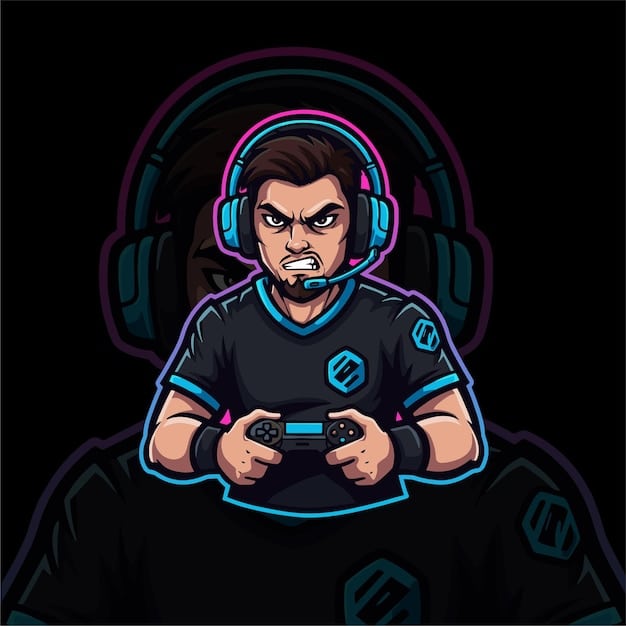Esports Talent Management: Get $50K+ Endorsement Deals (US)

Esports talent management is crucial for securing lucrative endorsement deals for US players, involving strategic negotiation, brand alignment, and performance optimization to maximize earning potential and career longevity in the competitive gaming industry.
Navigating the world of esports can be complex, especially when it comes to securing endorsement deals. For US players aspiring to earn $50,000 or more, effective esports talent management is essential.
Understanding the Esports Talent Landscape
The esports industry is booming, creating numerous opportunities for talented players. However, standing out and securing lucrative endorsement deals requires more than just skill; it demands a strategic approach to esports talent management.
Let’s delve into what this landscape looks like and what players in the US need to understand to succeed.
The Role of Talent Management Agencies
Talent management agencies play a pivotal role in representing esports players. They act as intermediaries, connecting players with potential sponsors and negotiating contracts on their behalf.
These agencies typically offer services such as contract negotiation, brand building, and financial planning.
Key Players in the US Market
The US market boasts several prominent esports talent management agencies. These agencies have a proven track record of securing high-value endorsement deals for their clients. Here are a few key players:
- Loaded: Focuses on content creators and esports personalities, securing partnerships with major brands.
- Evolution Media Talent: Manages a diverse range of esports athletes and influencers, offering comprehensive management services.
- ESP Esports Agency: Specializes in representing professional esports players, with a focus on contract negotiation and sponsorship opportunities.
Effective esports talent management involves a deep understanding of the current market trends, player valuation, and negotiation strategies.

Building Your Personal Brand
In the world of esports, having a strong personal brand can significantly impact your ability to attract endorsement deals. Your brand is how you present yourself to the world, and it should resonate with your target audience and potential sponsors.
Think of your personal brand as your unique selling proposition. It’s what sets you apart from other players.
Creating a Professional Online Presence
Your online presence is often the first thing potential sponsors will see. Ensure it is professional, consistent, and engaging. This includes:
- Social Media: Maintain active and engaging profiles on platforms like Twitter, Instagram, and Twitch.
- Website/Portfolio: Showcase your achievements, skills, and personality on a professional website or online portfolio.
- Content Creation: Regularly create content such as gameplay highlights, tutorials, and behind-the-scenes videos.
Engaging with Your Audience
Building a loyal fan base is crucial for attracting sponsors. Engaging with your audience demonstrates your value and appeal.
This can be achieved through:
- Live Streams: Interact with viewers during live streams, responding to comments and questions.
- Social Media Interaction: Regularly respond to comments and messages on social media.
- Community Events: Participate in community events to connect with fans in person.
Building a strong personal brand and engaging with your audience are essential steps in securing endorsement deals through effective esports talent management.
Negotiating Endorsement Deals
Negotiating endorsement deals is a critical aspect of esports talent management. Understanding the terms and conditions, as well as your own worth, is essential to securing a favorable agreement.
This is where professional talent management can be invaluable.
Understanding Contract Terms
Before signing any endorsement deal, carefully review all contract terms. This includes:
- Payment Schedule: Understand how and when you will be paid.
- Obligations: Know what is expected of you in terms of appearances, content creation, and performance.
- Exclusivity: Be aware of any exclusivity clauses that may limit your ability to work with other brands.
Determining Your Worth
Determining your worth is essential for negotiating effectively. Consider factors such as:
- Audience Size: How many followers and viewers do you have?
- Engagement Rate: How actively engaged is your audience?
- Performance: How well do you perform in tournaments and competitions?
Leveraging Your Agent
Your agent plays a crucial role in negotiating on your behalf. They can leverage their industry knowledge and relationships to secure the best possible deal.
Ensure they understand your goals and are committed to representing your best interests.
Successful negotiation is a key component of strategic esports talent management, ensuring fair compensation and favorable terms for the athlete.
Maximizing Your Earning Potential
Once you’ve secured an endorsement deal, it’s important to maximize your earning potential through smart financial planning and strategic career management. Esports talent management goes beyond just securing deals; it’s about building a sustainable career.
Here’s how you can make the most of your endorsement opportunities.
Financial Planning and Investment
Smart financial planning is essential for long-term success. Consider working with a financial advisor who understands the unique challenges and opportunities of the esports industry.
This includes:
- Budgeting: Create a budget to track your income and expenses.
- Saving: Save a portion of your earnings for future investments and retirement.
- Investing: Invest in assets that can generate passive income and grow your wealth.
Expanding Your Revenue Streams
Don’t rely solely on endorsement deals for income. Explore other revenue streams such as:
- Content Creation: Monetize your content on platforms like YouTube and Twitch.
- Merchandise: Sell branded merchandise to your fans.
- Coaching: Offer coaching services to aspiring esports players.

Long-Term Career Management
Esports careers can be short-lived, so it’s important to plan for the future. Consider:
- Education: Pursue educational opportunities to develop skills outside of gaming.
- Networking: Build relationships with industry professionals who can provide guidance and support.
- Transition Planning: Prepare for a transition out of competitive play, whether into coaching, management, or another field.
Maximizing earning potential through financial planning and diversified revenue streams is a hallmark of effective esports talent management.
Avoiding Common Pitfalls in Esports Talent Management
The esports industry is fraught with potential pitfalls that can derail even the most promising careers. Effective esports talent management includes being aware of these risks and taking steps to mitigate them.
Here are some common pitfalls to avoid:
Unrealistic Expectations
Many aspiring esports players have unrealistic expectations about their earning potential and career trajectory. It’s important to have a realistic understanding of the industry and the challenges involved.
This includes:
- Understanding the Competition: Recognize that the esports industry is highly competitive, with a large number of players vying for a limited number of opportunities.
- Setting Realistic Goals: Set achievable goals and celebrate small victories along the way.
- Patience and Persistence: Understand that success in esports takes time and effort.
Poor Contract Negotiation
Signing unfavorable contracts can have long-term consequences. Always carefully review contract terms and seek professional advice before signing any agreement.
This includes:
- Understanding Contract Language: Familiarize yourself with common contract terms and conditions.
- Seeking Legal Advice: Consult with a lawyer who specializes in esports contracts.
- Avoiding Pressure: Don’t feel pressured to sign a contract before you are ready.
Burnout and Mental Health
The demanding nature of esports can lead to burnout and mental health issues. It’s important to prioritize self-care and seek help when needed.
This includes:
- Taking Breaks: Schedule regular breaks to rest and recharge.
- Maintaining a Healthy Lifestyle: Eat a balanced diet, exercise regularly, and get enough sleep.
- Seeking Mental Health Support: Don’t hesitate to seek help from a therapist or counselor.
Avoiding these common pitfalls is crucial for long-term success in the esports industry, emphasizing the importance of proactive esports talent management.
Future Trends in Esports Talent Management
The esports industry is constantly evolving, and esports talent management must adapt to these changes. Staying ahead of the curve is essential for securing the best opportunities for your players.
Let’s explore some future trends in the field.
Increased Focus on Personal Branding
As the esports industry becomes more mainstream, personal branding will become even more important. Players who can build a strong personal brand will be in high demand.
This includes:
- Authenticity: Be true to yourself and let your personality shine.
- Storytelling: Share your story and connect with your audience on a personal level.
- Visual Appeal: Invest in high-quality visuals such as logos, graphics, and videos.
Data-Driven Decision Making
Data analytics will play an increasingly important role in esports talent management. Agencies will use data to identify promising talent, assess player performance, and negotiate endorsement deals.
This includes:
- Performance Metrics: Track key performance metrics such as win rates, kill-death ratios, and accuracy.
- Audience Analytics: Analyze audience demographics, engagement rates, and viewing habits.
- Market Research: Conduct market research to identify emerging trends and opportunities.
Globalization of Esports
Esports is becoming increasingly global, creating new opportunities for players from around the world. Talent management agencies will need to have a global presence and be able to represent players from diverse backgrounds.
This includes:
- Multilingual Support: Provide support in multiple languages.
- Cultural Sensitivity: Be aware of cultural differences and sensitivities.
- Global Networking: Build relationships with industry professionals around the world.
Keeping pace with these future trends is essential for effective esports talent management, ensuring players are well-positioned for success in the global arena.
| Key Aspect | Brief Description |
|---|---|
| 🤝 Talent Representation | Agencies connect players with sponsors and negotiate contracts. |
| ⭐ Personal Branding | Building a strong online presence and engaging with your audience. |
| 💰 Financial Planning | Managing earnings through budgeting, saving, and investing. |
| 📈 Data Analysis | Using data to assess performance and identify opportunities. |
FAQ
▼
Esports talent management involves representing professional gamers, helping them secure endorsement deals, negotiate contracts, and build a personal brand to maximize their earning potential and career longevity.
▼
Talent management agencies assist players by connecting them with sponsors, negotiating contracts, offering financial planning, and building a professional online presence through various content creation and social media strategies.
▼
Factors include understanding contract terms, determining your worth based on audience size and engagement, and leveraging your agent’s industry knowledge to ensure fair compensation and favorable terms.
▼
Common pitfalls include unrealistic expectations, poor contract negotiation, burnout, and mental health issues. It’s vital to maintain a healthy lifestyle and seek professional advice to mitigate these risks.
▼
Future trends involve an increased focus on personal branding, data-driven decision making, and the globalization of esports, requiring agencies to provide multilingual support and cultural sensitivity to players worldwide.
Conclusion
Effective esports talent management is crucial for any US esports player aiming to secure high-value endorsement deals. By understanding the landscape, building a strong personal brand, negotiating favorable contracts, maximizing earning potential, avoiding common pitfalls, and staying ahead of future trends, players can pave the way for a successful and lucrative career in the competitive gaming industry.





